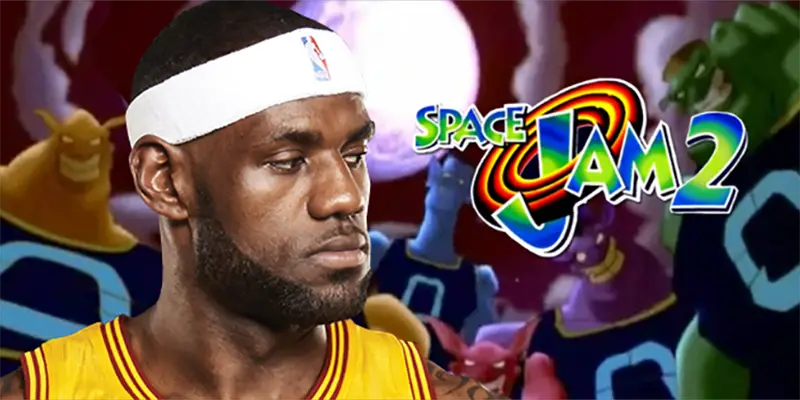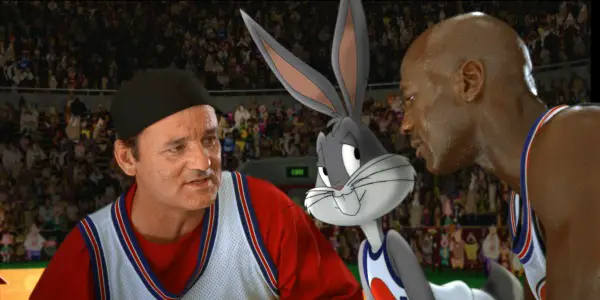Do You Believe A SPACE JAM Sequel Can Fly?

Alistair is a 25 year old writer based in Cambridge.…
We currently live in an age where sequels are determined by the success of a film’s opening weekend, announced on the morning after a healthy weekend gross is reported. Heck, in some cases, films get sequels before they are even released to success in the first place; but for every Guardians of the Galaxy that would happily boast it would return, you have a Last Witch Hunter with a broken ego and a failed franchise.
Has there ever been a good belated sequel?
Space Jam was released 20 years ago, in an entirely different pop culture cycle. Sequels were still a major part of the Hollywood system, but they definitely weren’t guaranteed – this was still the age of the costly megaflop movie, where a blockbuster movie still had the potential to sink an entire studio into bankruptcy if it didn’t find an audience.
Despite becoming a barnstorming success worldwide, even becoming the highest grossing basketball movie of all time (is there any higher accolade?), the movie seemed destined to join the pantheon of children’s classics that would remain without a sequel, no matter how many industry rumours circulated. A Space Jam sequel is to ’90s kids what a Goonies sequel was to ’80s kids – a tantalising prospect, but one that would no doubt have lost any nostalgic charm if renewed for a different generation, as it has so frequently been threatened over the years.
Only, that has recently changed – LeBron James is widely reported to fill Michael Jordan’s shoes in a decades-late sequel, which even as we speak still has one foot in development hell. Not only this, but Justin Lin (director of Fast Five and the upcoming Star Trek Beyond) has reportedly signed on as director. Lin is capable of directing ridiculous action and comedy (he was responsible for Community’s outstanding “Modern Warfare” episode), meaning that this potential franchise is in the hands of a filmmaker who can squeeze the most out of the material. But there is still an elephant in the room – sequels that materialise decades after the original film are seldom remembered as fondly, inspiring more vitriol from fans than appreciation.
It doesn’t even matter the strength of the creative team behind a project like this – in some cases, absence really doesn’t make the heart grow fonder, with many too-late sequels acting only to detract from what was so special about the original. Scorsese, Coppola, even Jack Nicholson in a rare directorial role couldn’t turn long-gestating sequels into anything remotely memorable, let alone essential viewing after the original. But why is this the case?

In the case of Coppola’s Godfather Part III, it was at least acknowledged as an embarrassing cash grab on his part – one that still bagged him a Best Picture nomination, but an embarrassing cash grab nonetheless. A Space Jam sequel isn’t exactly on the same page as a Godfather, Chinatown or Hustler sequel, but is very endemic of the same problem. After all, it doesn’t matter whether the film is a Colour of Money or a Zoolander No.2 – there has to be a logical reason as to why passion projects like these frequently feel so passionless. These movies mostly aren’t made for paychecks alone, as many of them are following up cult successes that weren’t box office hits, which makes their decline in quality despite years of lingering in self-inflicted development hell by their creators seem inexplicable.
The reality we have to face is that a Space Jam sequel is far more likely to be a soulless cash grab than a work of high cinematic art. After all, it is a sequel to what was originally pitched as nothing more than a cash grab in the first place. But there are still plenty of ways SJ2 can use the extended period in-between franchise entries to an advantage. The first is for the narrative to acknowledge the passing of time; the reason the Toy Story and Before… trilogies work so well is because the melancholic theme of time passing is so embedded into their stories. SJ2 will likely surface as a work of nostalgia for 90’s kids – why not build an entire story about how pop-culture and basketball have evolved in the following decades? Space Jam is far from an emotional film, but considering the kids who watched it have grown up to become cynical adults, watching a new sequel that ignores more mature thematic content could make them as jaded as the critics who bashed it in ’96.
A Minor Meta Masterpiece
Yet the opposite way to make the film work could be to double down on what made the original so special. Yes, it represented peak-’90s pop culture, but it was quietly more ahead of the curve than its somewhat dated nature suggests. The Looney Tunes had been indulging in fourth wall breaking meta humour for years, but married with live action sequences, the film transforms into an ahead of the curve spoof of not just basketball culture, but the self-obsessed nature of celebrity. This isn’t just a basketball comedy – at times it becomes a weird Larry Sanders-style satire for a young audience who won’t even get the references. To an international audience that doesn’t follow basketball as extensively, it is quite remarkable how this highly specific strangeness doesn’t get lost in translation.
Watching Space Jam today, it is hard not to think of the significant increase in meta kids comedies that have appeared in its wake. From George of the Jungle to The Lego Movie, these movies all vary in quality, yet have a consistently amiable skill of messing with narrative conventions and pop-culture fandom. On its original release, people derided the film for lazy writing. Now, it is clearly a deconstruction of sports movie tropes that understands gags are more important than narrative coherence.

When Bill Murray (as himself, no less) shows up at the climactic intergalactic basketball match, he simply responds to “how did you get here?” with a remark about being friends with one of the producers, ignoring all further questioning. It isn’t an apology for the film’s laziness, so much as it is a comment on the contrived nature of underdog narratives. Elsewhere, jokes about product placement and references to other movies appear frequently.
The only problem is that Space Jam equally inspired the plethora of kids movies that favour a “joke kids will understand, followed by one for the parents” approach to cracking gags. Space Jam may be responsible for why a product placement comedy like The Lego Movie can legitimately feel like pop art, but it is also responsible for utter dreck like Shark Tale and the majority of DreamWorks Animation’s output. Justin Lin and his co-writers need to embrace the weirdness and not treat their young audience as children, with designated jokes just for them.
Space Jam is a brilliantly weird family movie because it mostly ignores the tried and tested “joke conventions” for kids; with a remarkable amount of restraint, the film only indulges in one fart gag. This umbrella approach to comedy means that it doesn’t get stale when watched retroactively, with the dense referentiality meaning new jokes are still found upon each subsequent viewing. It is in this regard that the sequel may falter initially. But lets not forget, it took a while for Space Jam to begin a cultural re-evaluation as one of the decade’s defining films, for better or worse.
Conclusion
Any belated sequel is going to be judged in far harsher terms than its predecessor, not least because the culture as a whole has moved on. For Space Jam, the ’90s may have ended, but it has had a longer lasting impact on comedy than you would imagine. Kids are reveling in new Lego and Muppets movies, whilst adults are turning Deadpool and the Jump Street franchise into mega hits; in a nutshell, meta humour is far from uncommon in the mainstream. What was once a nonsensical kids film makes more sense in the current pop-culture climate. If the sequel understands this, you could find one of the first belated sequels to improve on the promise of the original.
What direction should the Space Jam sequel take?
Does content like this matter to you?
Become a Member and support film journalism. Unlock access to all of Film Inquiry`s great articles. Join a community of like-minded readers who are passionate about cinema - get access to our private members Network, give back to independent filmmakers, and more.
Alistair is a 25 year old writer based in Cambridge. He has been writing about film since the start of 2014, and in addition to Film Inquiry, regularly contributes to Gay Essential and The Digital Fix, with additional bylines in Film Stories, the BFI and Vague Visages. Because of his work for Film Inquiry, he is a recognised member of GALECA, the Gay & Lesbian Entertainment Critics' Association.













